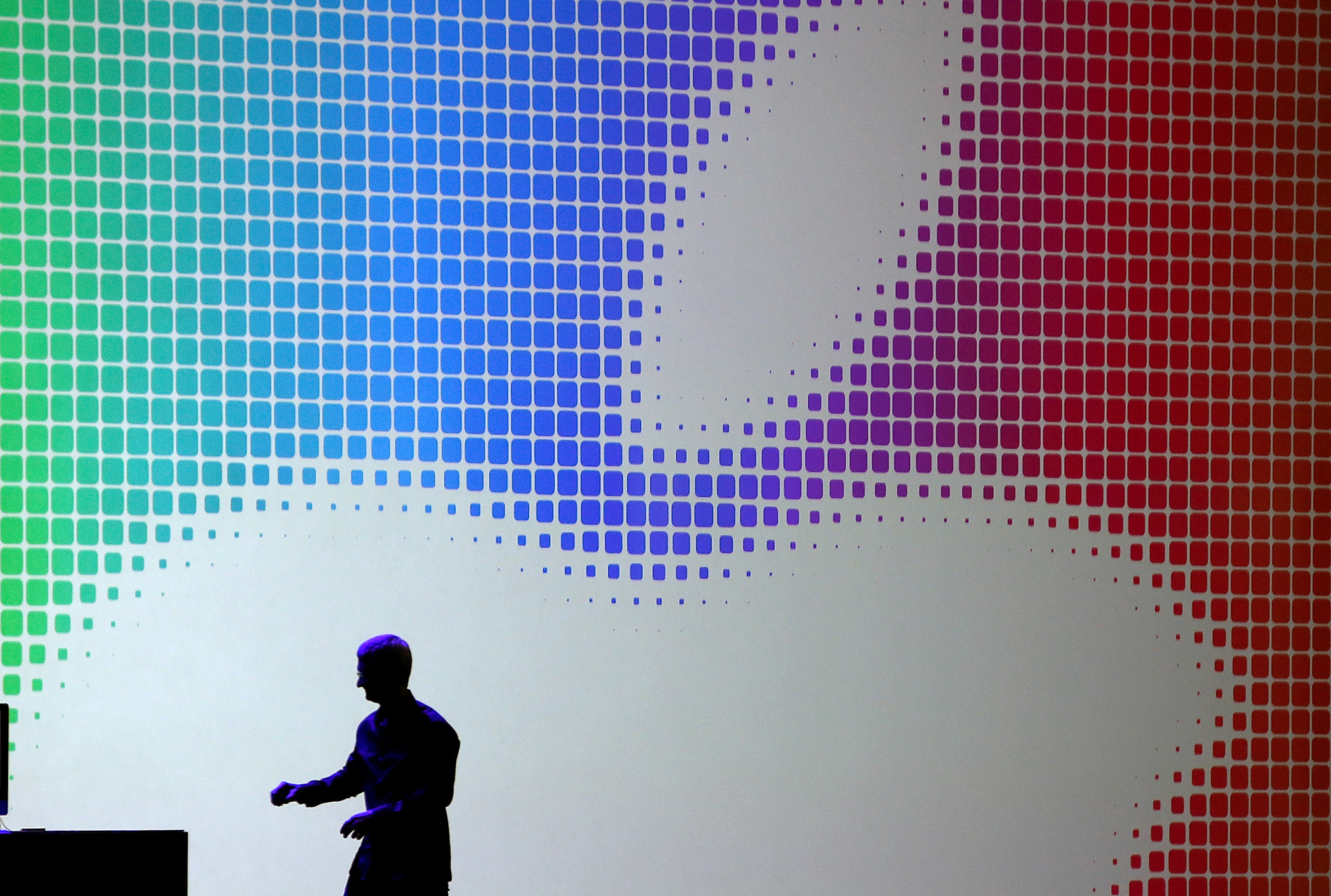
Every time someone asks Apple CEO Tim Cook when the company’s next new products are coming, Cook assures them they’re just around the corner. It’s just that Apple, to maintain its competitive edge, refuses to tip its hand.
When Apple announced its quarterly earnings last month, one analyst asked whether the company was in “a gap period” in which new products aren’t quite ready. “We have the strongest pipeline that we’ve ever had, and we’re really confident about the things in it,” Cook replied. “But as usual, we’re not going to talk about what’s ahead.” Another asked why the Cupertino, Calif. firm’s research and development spending had more than doubled in three years, growing much more quickly than revenue. Cook would only say that some of that spending would go to products in development.
For some, Cook’s discreet act is starting to look old. Apple released the iPod in 2001, the iPhone six years later and the iPad three years after that. All three have defined or redefined their markets in ways that the Apple Watch or Apple TV haven’t. It’s coming up on seven years since the iPad was unveiled, and Apple doesn’t seem to have its next big hit ready for showtime.
Read more: Review: Apple finally brings touch to the MacBook Pro
For investors, this is leading to impatience — and worry. Apple recently posted its first annual revenue decline in 15 years. Its stock is down 6% over the past year, despite paying investors $12 billion in dividends and $29 billion in stock buybacks. By contrast, the Nasdaq Composite is up 5%. And Apple’s longtime rival Microsoft is up an even more impressive 13%.
Under Steve Jobs, Apple became the corporate equivalent of Hank Aaron, a champion slugger. Five years into the Tim Cook era, Apple has managed some decent base hits, but it’s coming up short on homers. The company is far from broken, posting quarterly revenue of $46.9 billion in the most recent period. But that figure, impressive in a vacuum, marked a nearly 10% drop year-over year. And the iPhone, which makes up nearly two thirds of Apple’s revenue, saw revenue decline by 12% last fiscal year. The company synonymous with Silicon Valley innovation is now in need of a major hit.
[findthebest id=”9jMXCmT3FAN” title=”Apple Inc. (AAPL) Revenue – Last 5 Quarters” width=”650″ height=”502″ url=”https://sw.graphiq.com/w/9jMXCmT3FAN” link=”http://listings.findthecompany.com/l/8500602/Apple-Inc-in-Cupertino-CA” link_text=”FindTheCompany | Graphiq”]
“The cracks are showing in the Apple wall of invulnerability,” Oppenheimer & Co. analyst Andrew Uerkwitz wrote in a research note this week. He predicts the iPhone’s next release will offer “one last ‘growth’ hurrah.” And then? “Apple is about to embark on a decade-long malaise,” Uerkwitz said, arguing that Apple lacks the courage to lead in growth areas like artificial intelligence (AI) and the cloud.
Other analysts have expressed similar worries, though few of them so bluntly. Still others jumped to Apple’s defense. “I think they’re making a big mistake,” CNBC’s Jim Cramer said of Apple’s doubters. Technology analyst Horace Dediu, speaking at an investment conference, said that Apple has been de-emphasizing the notion it’s a hit-driven business, an expectation that has overshadowed its success in other areas.
Apple’s defenders can make a strong case. Revenue from services such as music streaming and Apple’s mobile app store grew by 22% in its last fiscal year, more than doubling the growth rate of fiscal 2015. Apple’s Other Products category, which includes the Apple Watch, Apple TV and Beats audio products, grew by 11%. Products that saw revenue decline, like the iPhone and MacBooks, recently received significant upgrades that will likely boost revenue in coming quarters.
There are also signs that Apple could unveil new products over the next year or so that could bring in new sources of revenue, if not replicate the iPhone’s smashing success. Apple is reportedly working on digital glasses that connect to an iPhone and display images through augmented reality. Some technology leaders, including Apple’s Cook, believe augmented reality will be bigger than virtual reality.
Health care is another area of potential growth for Apple. By building on its health apps and devices like the Apple Watch and iPhone, “Apple is on the cusp of playing a larger role in the healthcare industry,” Merrill Lynch analyst Wamsi Mohan wrote in a research note. That would put Apple in a unique position “to better monitor their health and interact with medical professionals in a seamless way relative to current methods.”
But there are also recent moves that support the Apple skeptics. The first MacBook Pro redesign in four years received lukewarm reviews, with some calling it “a step forward and a step back” and others concluding Apple was “shooting for a future it can’t quite reach.” Apple is also delaying shipments of its wireless AirPods and backing out of making products like routers and monitors. And it’s scaled back its automotive ambitions, too.
Cook has told investors Apple’s innovation pipeline is as healthy as its ever been. If so, the bigger questions are when new products will arrive, and how impressive they’ll be. The spirit of skepticism embraced by many on Wall Street is lowering the bar of expectations. If and when Cook does deliver a home run, it will catch many by surprise.
More Must-Reads from TIME
- Donald Trump Is TIME's 2024 Person of the Year
- Why We Chose Trump as Person of the Year
- Is Intermittent Fasting Good or Bad for You?
- The 100 Must-Read Books of 2024
- The 20 Best Christmas TV Episodes
- Column: If Optimism Feels Ridiculous Now, Try Hope
- The Future of Climate Action Is Trade Policy
- Merle Bombardieri Is Helping People Make the Baby Decision
Contact us at letters@time.com